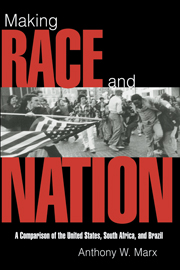Book contents
- Frontmatter
- Contents
- Preface and Acknowledgments
- 1 Introduction
- Part One Historical and Cultural Legacies
- 2 Trajectories from Colonialism
- 3 Lessons from Slavery
- 4 The Uncertain Legacy of Miscegenation
- Implications
- Part Two Racial Domination and the Nation-State
- Part Three Race Making from Below
- Notes
- Bibliography
- Index
Implications
Published online by Cambridge University Press: 05 June 2012
- Frontmatter
- Contents
- Preface and Acknowledgments
- 1 Introduction
- Part One Historical and Cultural Legacies
- 2 Trajectories from Colonialism
- 3 Lessons from Slavery
- 4 The Uncertain Legacy of Miscegenation
- Implications
- Part Two Racial Domination and the Nation-State
- Part Three Race Making from Below
- Notes
- Bibliography
- Index
Summary
Colonial and religious legacies, slavery, and miscegenation demonstrate that social constructions of race were evident in the early history of Brazil, South Africa, and the United States. These practices took different forms, but authorities consistently reinforced forms of discrimination, often justified by religious differentiation. Slavery itself may not have been initially associated with race per se, but its practice was racially distinguishing and defended accordingly. Rules about miscegenation and the treatment of “mixed race” peoples clearly referred to and encouraged ranked racial categorizations. In this sense, racial orders were evident by the nineteenth century, providing a foundation on which later social constructions could be and were built. Assumptions of primordial difference were prevalent, entrenched in institutions and culture, and given scientific credence.
This overview also demonstrates the fluidity of early images of race. As nature drew no sharp demarcations, distinctions understood as primordial took different shapes and meanings. Discriminatory practices and categories imposed according to physical differences varied by place and time, even within each of the three cases. Racism arose most explicitly when slavery was challenged or abolished, with the distinction on which domination rested shifting from that of being a slave to being black. The categorization and treatment of mulattoes also shifted within each country. In Brazil, and to a lesser extent in the United States and South Africa, mulattoes or coloureds were accorded distinct status by mid-nineteenth century when slavery was nearing extinction and whites were eager to find allies or intermediaries.
- Type
- Chapter
- Information
- Making Race and NationA Comparison of South Africa, the United States, and Brazil, pp. 77 - 80Publisher: Cambridge University PressPrint publication year: 1997

